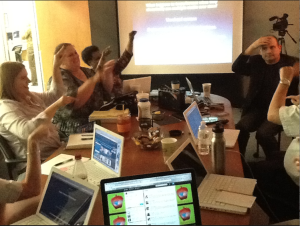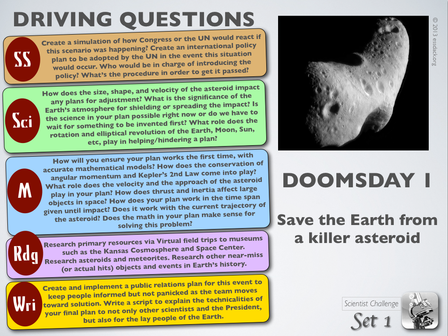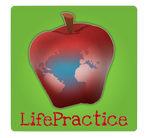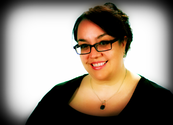
My PBL partner, Kevin Honeycutt and I are frequently asked questions like, “Do you know anything about PBL for (insert curriculum topic here).”
Usually the topic is something like “Financial Wellness for New Mothers” or “Religion of the 18th Century” or “Spanish for the Deaf” or “Advanced Mathematics for Budding Actuaries.” Really, it doesn’t matter the title of the class. What’s happening is that the school leader is struggling to help a teacher in a specialty area feel included in shifting education from something being done to kids to something that the kids are doing. And they see that PBL has helped in other classes. They’re really saying, “Can you help by giving this teacher resources that are specific to her area?”
Kevin and me, working with a great group of teachers in Texas.
The answer for this is yes, we can help that teacher with Project Based Learning, if that teacher is willing to work alongside sharing his/her content knowledge to build projects. But if that teacher is looking for a set of scripted lesson plans s/he can buy off the shelf and just “follow” for his/her specialty class…well, we’re probably not going to be able to help with that.
Because you see, Project/Problem Based Learning isn’t about a set of “wash n wear” lesson plans. It’s about engaging kids with the topic — whatever topic it is — in very active ways. If a teacher understands PBL, then any known academic content can be integrated. If you want to help that specialized teacher find lesson for that specialized content area, then allow him/her to learn the basics of PBL and s/he’ll be able to build the PBL for that specialized space.
So what about our LifePractice PBL recipe cards? Aren’t those lesson plans?
Actually, no. If you check them out closely, they’re not scripted lessons; instead they provide ideas and seeds for the toughest parts of PBL: driving questions, integrating, creative product, and creative grouping. They are not about someone who has never had any PBL training picking them up and using them like a traditional lesson plan. Like anyone picking up a recipe card for the first time, we still have to have the basics of cooking in our tool belts. And so would any teacher using our LifePractice PBL recipe cards need some initial training and practice in PBL. They don’t have to be experts to use them, but they do need some training.
If you’re a school leader who’d like to implement PBL in your schools, we’ll be there 100% for you and your teachers, providing engaged training to help all of your teachers partner their content knowledge with the tenets of PBL. If you want that specialty teacher to have assistance in moving her classroom toward a PBL approach, the first place to start is with high-quality learning for her.
Contact us for more information.
Usually the topic is something like “Financial Wellness for New Mothers” or “Religion of the 18th Century” or “Spanish for the Deaf” or “Advanced Mathematics for Budding Actuaries.” Really, it doesn’t matter the title of the class. What’s happening is that the school leader is struggling to help a teacher in a specialty area feel included in shifting education from something being done to kids to something that the kids are doing. And they see that PBL has helped in other classes. They’re really saying, “Can you help by giving this teacher resources that are specific to her area?”
Kevin and me, working with a great group of teachers in Texas.
The answer for this is yes, we can help that teacher with Project Based Learning, if that teacher is willing to work alongside sharing his/her content knowledge to build projects. But if that teacher is looking for a set of scripted lesson plans s/he can buy off the shelf and just “follow” for his/her specialty class…well, we’re probably not going to be able to help with that.
Because you see, Project/Problem Based Learning isn’t about a set of “wash n wear” lesson plans. It’s about engaging kids with the topic — whatever topic it is — in very active ways. If a teacher understands PBL, then any known academic content can be integrated. If you want to help that specialized teacher find lesson for that specialized content area, then allow him/her to learn the basics of PBL and s/he’ll be able to build the PBL for that specialized space.
So what about our LifePractice PBL recipe cards? Aren’t those lesson plans?
Actually, no. If you check them out closely, they’re not scripted lessons; instead they provide ideas and seeds for the toughest parts of PBL: driving questions, integrating, creative product, and creative grouping. They are not about someone who has never had any PBL training picking them up and using them like a traditional lesson plan. Like anyone picking up a recipe card for the first time, we still have to have the basics of cooking in our tool belts. And so would any teacher using our LifePractice PBL recipe cards need some initial training and practice in PBL. They don’t have to be experts to use them, but they do need some training.
If you’re a school leader who’d like to implement PBL in your schools, we’ll be there 100% for you and your teachers, providing engaged training to help all of your teachers partner their content knowledge with the tenets of PBL. If you want that specialty teacher to have assistance in moving her classroom toward a PBL approach, the first place to start is with high-quality learning for her.
Contact us for more information.



 RSS Feed
RSS Feed
